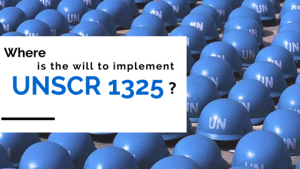By: Clara Fisher, Paige Harland, Kat Ilich, and Erin McGown
In October 2000, after years of lobbying by women’s rights activists, the UN Security Council passed Resolution 1325 on Women, Peace, and Security (WPS). UNSCR 1325 brought the WPS agenda to the UN system’s attention for the first time, calling on all actors to take women’s unique needs and experiences in conflict into account and bring women into peace and security mechanisms in greater numbers.
16 years on, the UN system is still talking the talk but not walking the walk. The four of us, all graduate students at George Washington University’s Elliott School, took note of the implementation gaps when UN Women published a Global Study last year to mark the resolution’s 15th anniversary. Despite us each having different backgrounds and interests, we all share a common experience of studying international affairs in the powerhouse of the nation’s capitol—an old boy’s club if there ever was one. Feeling the male-dominated nature of the city’s power structures and the emphasis placed on security studies over gender studies at our own university, our eyes were collectively opened to the need to integrate a gender perspective in international relations. The Global Study planted the idea in our brains of looking at the weak to-date implementation of the WPS agenda for our thesis research project. It felt like an ideal intersection of two things we all share and hold dear: feminism and a desire to improve the world through international relations.
The passage of Resolution 1325 was a landmark occasion for several reasons. It was the first Security Council resolution to focus on the essential role of women in conflict resolution, peacebuilding, and security institutions. The Resolution suggests action to protect women and girls from wartime gender-based violence, recognizes the different needs of female and male combatants in disarmament, demobilization, and reintegration (DDR), and aims to ensure the full participation of women in conflict resolution and peacebuilding. Fully implementing UNSCR 1325 should be a top priority for the UN because including a gender perspective in peace processes is key to their long-term success. Ambassador Anwarul K. Chowdhury, Security Council President at the time of UNSCR 1325’s passage, said that the main point of the resolution was not only “to make war safe for women, but to structure peace in a way that there is no recurrence of war and conflict.” To that end, UNSCR 1325 has been instrumental in changing the way the international community thinks about the role of women in peace and security.
Our project is looking specifically on implementation of 1325 in UN peacekeeping. Unfortunately, tangible policies spurred by UNSCR 1325 in this arena have been slow and few, failing to match the urgency of the issue. This failure results in extensive sexual violence, including the rape of women and children by peacekeepers; higher rates of a return to conflict after the exit of peacekeeping forces; and a loss of credibility for both the peacekeeping mission and the UN as a whole.
That’s why we designed our project to identify the disparities in implementation of this important resolution. By studying the areas in which implementation has not been fully realized, or where it is not well-enforced, we hope to find common trends from which to recommend solutions. With the guidance and support of WIIS, we plan to publish our findings in the coming months. And, of course, we hope that, by offering our research to the world, we might make some kind of impact on the issue.
For those equally interested in the role of women in conflict resolution, peacebuilding, and security, we will host a public event to present the results of our research in late May at the Elliott School. We hope to see you there!
*Our research project is being undertaken in partnership with Women in International Security (WIIS), who are providing valuable expertise and guidance along the way.

